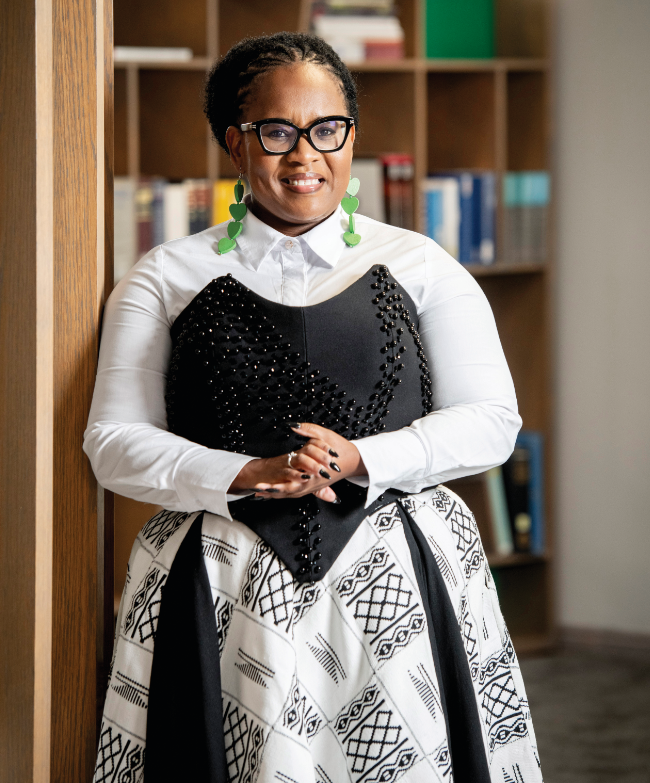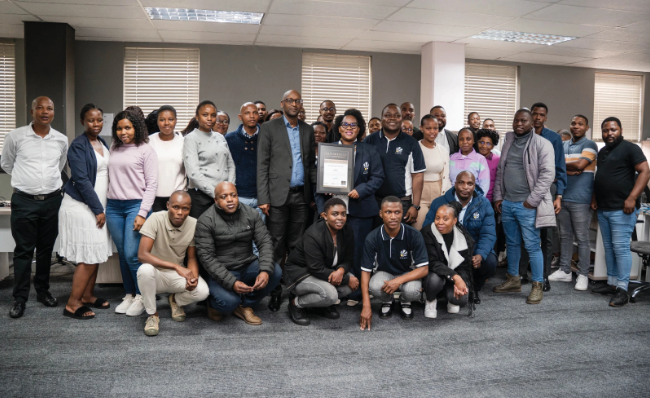The signing into law of new bills, like the National Council on Gender-Based Violence and Femicide Bill this May, plus the many other laws and policies that advocate for female empowerment, places South Africa in a position of strong contention for achievement of radical transformation. Only if we can implement them well and consistently across all sectors, can we directly address the “why” of the continuation of lack of female CEOs in the JSE Top 40 entities.’
These are the words of Ayanda Mafuleka, CEO of FASSET – the Finance and Accounting Services Sector Education and Training Authority – the SETA that is responsible for financial management, accounting and auditing skills in the country.
Mafuleka has been prolifically vocal about her concerns around the lack of women at the helm of companies. ‘We need role models to accelerate the process of building a more equal workplace and create space for women at the highest levels of leadership for so many reasons. It’s well documented that women forge strong relationships that are essential to developing exceptional teams, which improves productivity and team dynamics,’ she says.
‘I have long held the firm view that we need a fertile breeding ground to support the growth of opportunities. One of the ways to do this is to establish and strengthen women’s networking platforms, which will allow the lens of women’s needs and empowerment issues to be vocalised.’
Her view is substantiated by an August 2024 Stats SA report – Gender Gaps Persist in SA Labour and Leadership – which surmises that economic empowerment is the cornerstone of achieving gender equality.
‘Attending to women’s struggles for economic liberation from root level, such as programmes to increase women inclusion in STEM subjects and careers – to leadership platforms, such as FASSET’s Executive and Middle Management Development programmes – simultaneously and consistently is the only way to have true transformation of not only the JSE Top 40 entities, but our country as a whole.’
In addition, FASSET has another two programmes that speak directly to advancing employed women. The bursary for the employed individual is a programme to assist individuals who want to further their studies in order to increase their skills base and knowledge so that they can graduate from lower positions to higher positions. The other is a new professional body designation status that assists candidates with the acquisition of new skills and knowledge to better position themselves to occupy executive positions.
‘At the core of these is FASSET’s drive for black females to be assisted in developing leadership capacity,’ says Mafuleka. ‘We have already trained some 1 750 black female professionals and are on path to our goal of training 2 000 female women leaders by the end of September 2025. This is not [taking into account] the multiple other women impacted, as we have purposefully built the training to be a “lift-as-one-rises”, with a focus on creating networks for women.’
The organisation has invested more than R200 million across its female development programmes that are hosted by Wits Business School and an International Women’s Forum of South Africa partnership with Duke Corporate Education. The insights are revealing.
‘Upon completion, attendees have emerged not merely as leaders, but ethical and bold leaders who continue to take up spaces in both the public and private sectors. These are courageous and decisive leaders who are ready to elevate their voices in the spaces of transformation. Additionally, the programmes influence their confidence and presence within the spaces they find themselves,’ she says.
It wouldn’t surprise Mafuleka if one of these women were to become SA’s first female president.
‘Through our uptake of the FASSET empowerment programmes, I am more convinced than ever that there is capability and availability for a woman to be at the helm of the country. I believe lack of opportunity and platforms is what needs to be addressed to see this come to fruition. The women’s lens is needed to sustainably grow the economy and transform the country to reflect the majority gender in the population.
‘Women’s struggles can no longer be rendered secondary when in fact they form part of all the struggles we face, one of which is the scourge of gender-based violence, which has been particularly vile in the country. It has translated into the social subjugation of the female’s right to mould and craft a world that includes her full participation and benefit within it.
‘We also have to consider low economic growth or unemployment impacts females and their ability to advance in careers. Women’s voices need to be accounted for on platforms that present them, with an opportunity to provide the solutions sought.’
In the five years since Mafuleka took the helm at FASSET, her focus has been to build strong teams and promote the ‘black child’s endless possibilities and a woman’s agency.’ As a chartered accountant and her exposure as a CFO, she has guided the FASSET team to deliver clean audits and excellent results across the board. She has also driven partnerships with stakeholders across public and private sectors, including SME-led enterprises increasing their visibility.
As a result, FASSET has been able to introduce a CEO Roadshow. It has also partnered with TVET and community education and training (CET) colleges, where the organisation has launched fully fitted state-of-the-art ICT hubs at 45 TVET colleges, and supported nine CET colleges with mobile classrooms, so that FASSET can facilitate the nurturing of new young female leaders at an early age.
‘Attending to women’s struggles for economic liberation must be from root level,’ says Mafuleka. ‘We need to introduce more programmes that increase women inclusion in STEM subjects and careers, particularly in the finance sector, which is vital in the world of work. I believe that if successful women share their learnings and pay it forward, we can all be opportunity creators for those who come after us.’











